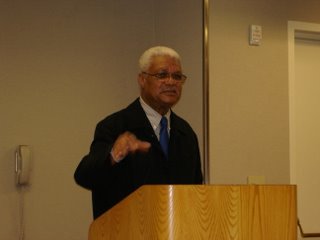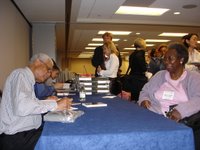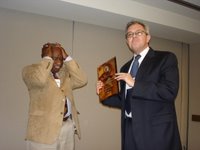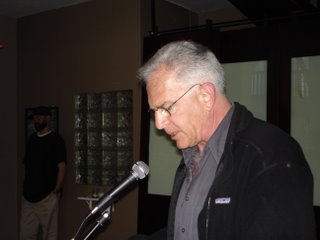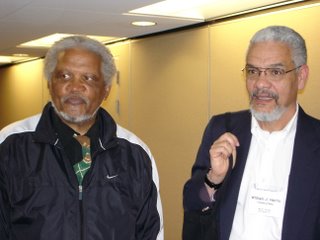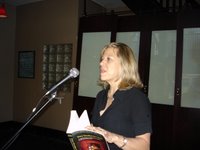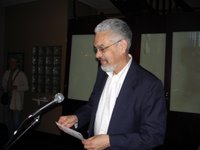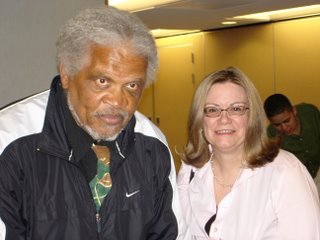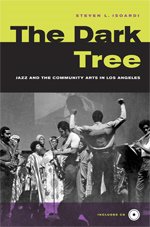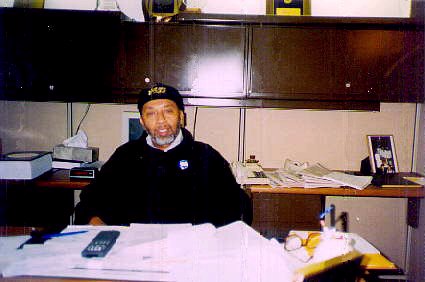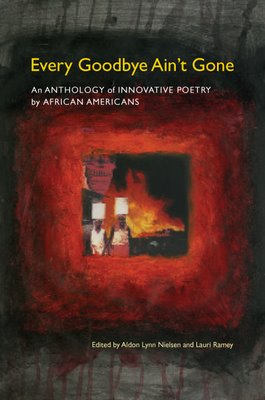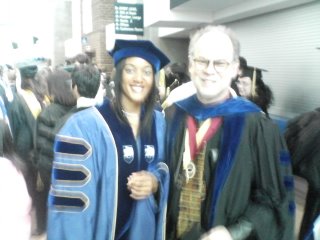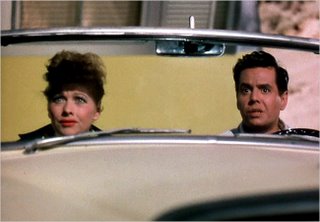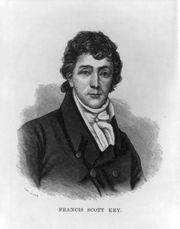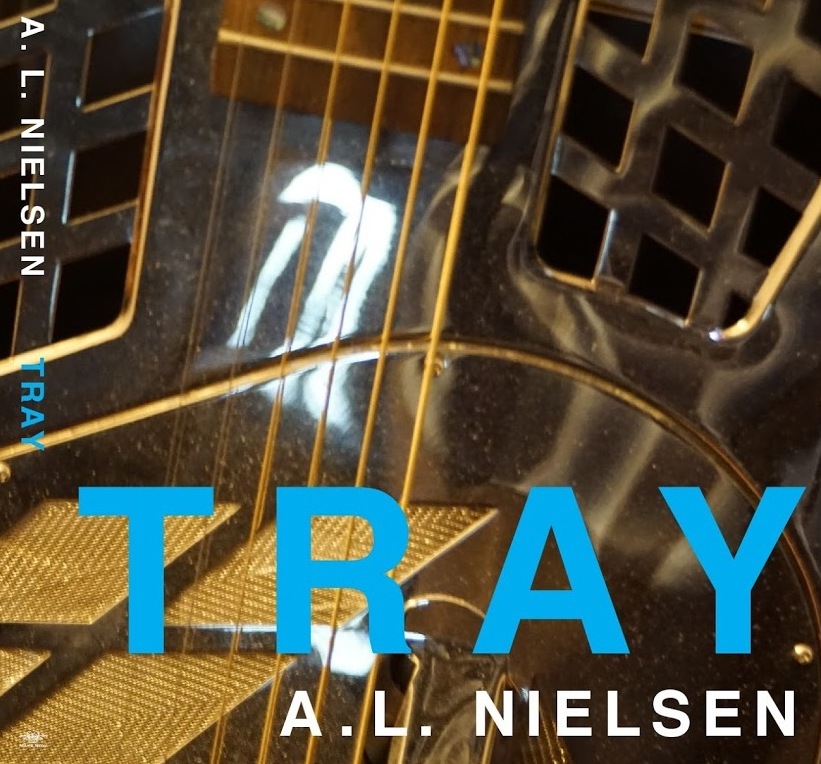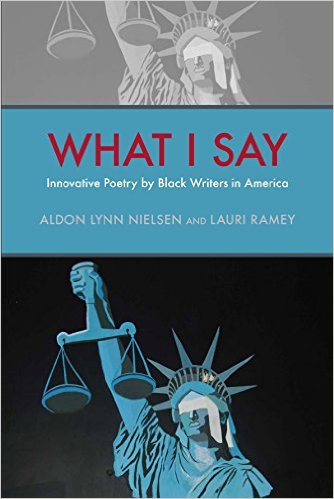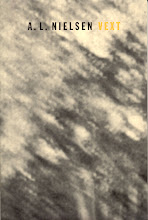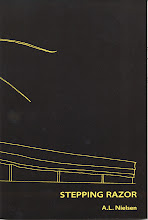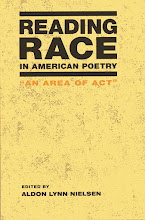

Well, sort of – Geri Allen didn’t actually perform at the Modern Language Association itself. The last thing that approached such an event in my memory occurred when Ellis Marsalis performed as part of a special session at a conference of the Modern Language Association in Chicago many years ago.
Here’s what did happen.
I am in the second year of a three year term on the Program Committee of the Modern Language Association, the committee that would approve a special session featuring Geri Allen if anybody ever proposed such a thing. Our duties include meeting together in New York once a year to discuss the hundreds of proposals for special sessions that come in each year from the membership. The committee members receive copies of the proposals in advance, read them all and make notes, then gather together at the MLA offices on lower Broadway to make final decisions. It’s a whirlwind trip, most of which is spent in the offices, though the MLA does treat us to a dinner at a nearby restaurant, and I usually manage to fit in a quick expedition to Saint Marks book store.
So that’s where I’ve been the past few days, not blogging from the scene, because the hotel where we were lodged charges $17 per day for internet access. There is supposed to be free WiFi access in the hotel lobby, but of course it didn’t work. (I was a bit suspicious when I found that the WiFi service you can pay for to have access in meeting rooms for conferences was available, but the free access in the lobby was not.) Everything else about the hotel was just fine, though the committee work keeps us busy enough that we aren’t in the hotel enough to notice much.
But this turned out to be a different hotel than the one we stayed in for last year’s meetings, closer to Times Square this time AND, as I discovered when I walked around the corner to get some iced tea my first morning in town, just a few doors away from the Iridium Jazz club – the first of several pleasant surprises. The second was the notice on Iridium’s door that Geri Allen was to be the featured performer Thursday through Saturday nights.
Geri Allen has been in my pantheon of jazz greats since I first heard THE PRINTMAKERS and HOMEGROWN more than two decades ago. Through recordings like MAROONS, THE GATHERING, TWYLIGHT, THE NURTURER and OPEN ON ALL SIDES, Allen has shown herself to be among the most consistently rewarding pianists and composers on the scene. In addition to her own works as soloist and group leader, she has appeared in settings with people like Paul Motian, Charlie Haden and Ornette Coleman. One reason I was so excited to find that she was appearing right around the corner from my hotel was that it had been twenty years since the last time I’d seen her in concert.
That last concert had been a tribute event on the campus of Howard University, where I was teaching at the time. Geri Allen was on the bill because the tribute was in honor of the music department faculty member who had been her own piano teacher when she was a Howard Student. The surprise that time came late in the program when a duet performance was announced and Geri Allen was joined on the piano bench by Mark Batson, who was a student in my English composition class. I had known that Mr. Batson played the piano, but I had never heard him in performance and had not known how advanced his playing was already while he was a student. He more than held his own with Allen. (And I should add that he did exemplary work in the English class too.) In later years I would see Batson’s name on recordings by Jean Paul Bourelly and others, and he is now a much-sought-after producer as well as a musician.
Come Friday, I was determined that I was going to see a Geri Allen set at Iridium before I returned home. Since I had a day-long flight back to California coming up, I decided to go to the early show. That isn’t always the thing to do. The first show of the evening can be a shaky start with some performers, but I had never heard of Geri Allen giving anything less than the best performance no matter what the circumstances, and so I elbowed my way through the crowds of people dressed up to go see MAMA MIA for the fourth time and walked down the stairs to the Iridium club.

The club itself was another pleasant surprise, smaller and more intimate than I had expected. It put me in mind of the old Cellar Door club in the D.C. of my youth, where there was no such thing as a bad seat. Having arrived early (I’d thought there’d be a line – but this wasn’t ABBA music like MAMA MIA), I decided to try dinner at the club, and that proved a good decision. While I was eating I got to know the people at the tables to my right, in town for the charity walk & run that closed 7th Avenue the next morning, and a local man who, like me, had come specifically to hear Geri Allen. While the lights were still up prior to the show, I took a look at the card that was on my table, and then the surprises started coming hard and fast.
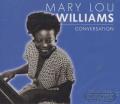
It turned out that, in celebration of Mary Lou Williams’s birthday (New York was also celebrating Freud’s birthday – the Mayor declared Sigmund Freud Day in New York – there was no Mary Lou Williams Day), Geri Allen and her group were planning a performance that night of Williams’s ZODIAC SUITE.
Mary Lou Williams was one of the indispensables, one of the incorruptibles – from the time she went out on the road at age 13 till her final day. Like Coleman Hawkins, she was somebody who opened the pathways of early jazz and then lived on to encourage and work with the subsequent generations of innovators. From her work with Andy Kirk’s Clouds of Joy to her incomparable duet appearance with Cecil Taylor decades later, Williams was always an explorer and a master of technique.

ZODIAC SUITE dates to her compositions of the 1940s. There are two recorded versions currently available, one in a small group context (which is available from Smithsonian Records) and another with a larger orchestra recorded live. Geri Allen performed the work at Lincoln Center in March of 2004, and a portion of that concert was aired on public radio last year. I have a recording of that performance that I have been listening to intently, waiting for an opportunity to hear the entire suite performed. More recently, Allen recorded the suite as part of the Mary Lou Williams Collective, and that session has been released on Mary Records in support of the Mary Lou Williams Foundation, an organization Williams formed to support work with youth.
The card on my table brought me another surprise, too. It turned out that the gentleman I’d seen preparing the drum set and setting up his mini-disk recorder on the stage was Andrew Cyrille. Cyrille is a major figure in jazz himself, whose recordings I’ve been listening to for nearly four decades. He has worked often with poets, including both Amiri Baraka and Elouise Loftin. I write about his work with Loftin briefly in BLACK CHANT.

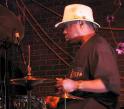
I had finished dinner, and now had to leave off reading as the lights were dimming for the first show. I’d noticed a man walk to the corner of the stage and pick up the microphone that was at the piano, and had assumed he was a club manager getting ready to introduce the night’s early show. But instead, a disembodied voice came over the PA system to welcome the small audience there gathered and to introduce the man on the stage. It turned out that he was Father Peter O’Brien, S.J., whose name I immediately recognized from Linda Dahl’s great biography of Mary Lou Williams, MORNING GLORY. O’Brien had become close to Williams following her turn to religion later in her life, and managed her career for a time. He is continuing to care for Williams’s legacy through the activities of her foundation and through promoting her music.

It was O’Brien’s task to spring the next surprise on us. It turned out that Geri Allen had just phoned in from whatever tunnel into Manhattan she was stuck in at the moment. We were given assurances that she would be there shortly; in the meantime, Andrew Cyrille and bassist Kenny Davis would perform as a duo. I hadn’t known of Davis before, but he had me within a few bars of SO WHAT as he kicked it off. Following a few stunning runs through the number, Davis and Cyrille started furiously trading fours, sixes and eights. I could tell from the faces on the audience members that all of us would have been happy to hear an entire evening of this pair at some point.
Then, as promised, Geri Allen quietly slipped through a door (I kept remembering Frank O’Hara and the door at the Five Spot as I watched this) and took her place at the piano. But I could tell from her smile that she was enjoying what Davis and Cyrille were doing herself, and she made no move to cut them off. She waited patiently poised over the keyboards, only adding her chords at the very conclusion. Then, with just a few words into the mic (an apology for her late arrival, a quick thanks to Davis & Cyrille, and then on to the Suite), she plunged right into ARIES.
From there it was a wondrous cycle through all the signs of the suite. I’m a notorious skeptic of all things astrological, but in the same way that I am glad to have St. Matthew’s Passion, I’m grateful that the Zodiac gave us this fine suite by Williams – Even more grateful that Libra turns out to be such an integral element of the work. Allen never turns in a rote repetition of Williams’s compositions; she finds an innovative turn in each sign’s segment. One of the fun elements of a live performance is seeing her turn from an improvisation, quickly turning over the pages of the score on the top of the piano in front of her to remind herself of the next corner that she and the band have to negotiate. From my seat just an arm’s reach away from the piano, I was able to see every move of her fingers, able to make a fan’s study of her technique (which answers that question that keeps popping into your mind while listening to recordings, “how’d they do that?”). Allen’s communication with Davis and Cyrille was another wonder to behold. I’ve heard Allen in a number of settings now, and this trio has to rate as among her best units.

For the purpose of these performances, the trio is identified as THE MARY LOU WILLIAMS COLLECTIVE, and that is how the CD of the suite now available from Mary Records is also credited. On the CD, Allen is joined by Buster Williams on bass and Billy Hart on drums, another great combination of voicings. Andrew Cyrille appears on the CD on two numbers, Herbie Nichols’s BEBOP WALTZ and Allen’s own THANK YOU MADAM, both works composed under Williams’s influence. I think most people who hear any version of the ZODIAC SUITE will want to get all three of the currently available renditions, by Williams and by Allen, for an exciting comparative listening.
The Iridium will let you stay for the next set with no additional cover charge – you just have to meet the drink minimum again, which isn’t hard to do when you’re having fun in Manhattan, but I had to get back to the hotel and prepare for the next day’s trip. Despite the joy that emanated from Geri as she finished her first set and left the stage, I had to tear myself away. I paused to introduce myself to Cyrille, with whom I had spoken on the phone a while back, and I talked a bit with Father O’Brien at the door as I was leaving. We both expressed our hope that the one other large ensemble recording of a Williams performance of ZODIAC, the acetates of which were actually stolen from the venue of the concert, will one day be available to the public.
Then I was back up at sidewalk level, wondering again at the disparity between the huge audience for ABBA and the small numbers in the audience for the Geri Allen set. But I also kept thinking of that group of tourists who sat near me during the show. None of them had heard of either Geri Allen or Mary Lou Williams before that night. They had enjoyed other jazz shows back home and just came to the Iridium out of curiosity and convenience. I’ve no doubt that the ABBA fans came away from the theater happy with their evening, but I’d be willing to bet that the tourists sitting in the Iridium that night came away with the sense of discovery that I felt when I first heard this music, and that I felt again that night as Geri Allen, Kenny Davis and Andrew Cyrille worked their changes on those compositions.
That’s modern language –
To reach Geri Allen's home page, click on her photo here:

For information on the Mary Lou Williams Collective's recording of ZODIAC SUITE click on this album cover:
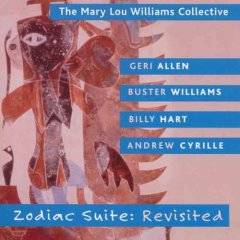
 Back at the beginning of this blog, I reported one of David Horowitz's many audacious untruths, his claim, made in the course of his ramble at Duke University, that Cornel West had not published a scholarly paper in the past twenty years. As I pointed out then, anybody who had twenty seconds to spare for a google search could quickly dispense with this nonsense. Even if we disregard Wests's multitude of essays in publications that are not peer-reviewed, we still have such entries in the West bibliography as his 2000 essay in ENGLISH JOURNAL (Vol 89, Number 6 for those of you keeping track of such things), a journal with impeccable credentials.
Back at the beginning of this blog, I reported one of David Horowitz's many audacious untruths, his claim, made in the course of his ramble at Duke University, that Cornel West had not published a scholarly paper in the past twenty years. As I pointed out then, anybody who had twenty seconds to spare for a google search could quickly dispense with this nonsense. Even if we disregard Wests's multitude of essays in publications that are not peer-reviewed, we still have such entries in the West bibliography as his 2000 essay in ENGLISH JOURNAL (Vol 89, Number 6 for those of you keeping track of such things), a journal with impeccable credentials.
